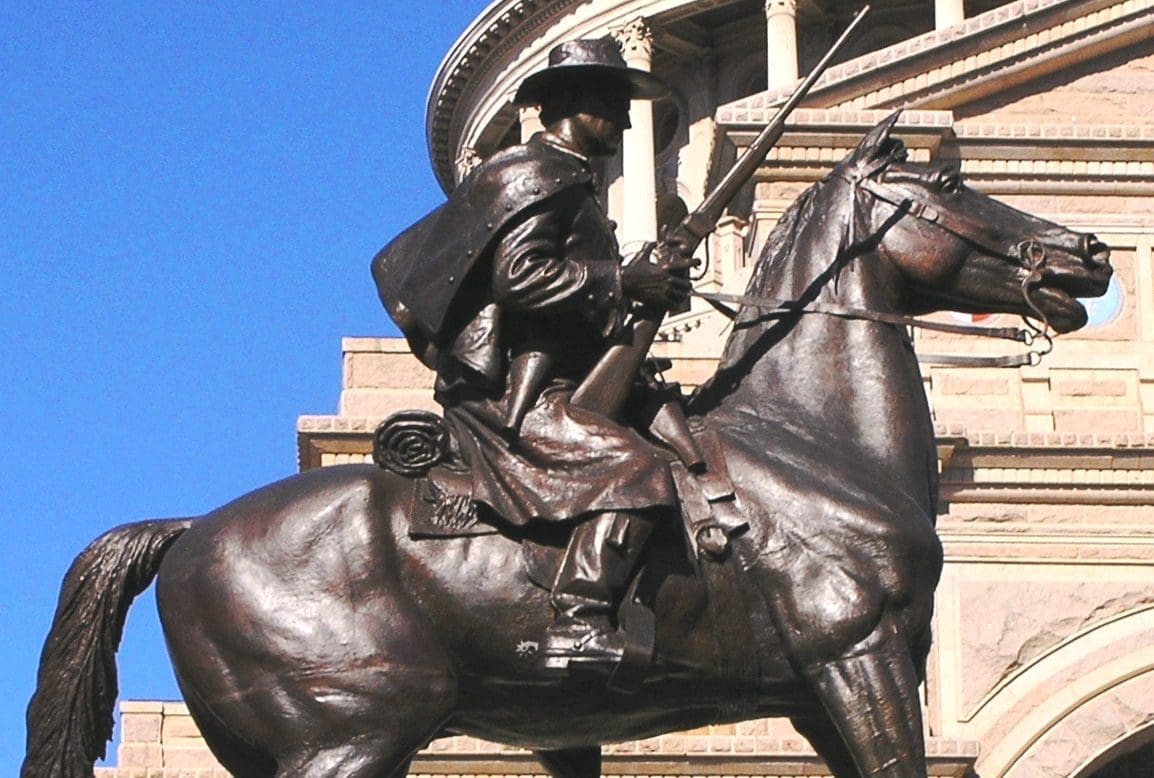One of the Republican Party of Texas’ official legislative priorities includes protecting monuments across the state from being “removed, defaced, destroyed, or otherwise dishonored.” In July 2020, Republican Party of Texas delegates selected eight issues from a pool of 15 to represent the GOP’s top concerns for future legislative sessions.
Although monument protection was chosen as one of these priorities, the Republican-controlled state Legislature made no progress on the issue.
This priority also highlights the protection of a cenotaph located inside the Alamo Plaza, commemorating the estimated 200 men who died defending the building.
Preservation of the Alamo and its featured cenotaph became an official GOP priority after controversy surrounding a 2017 project aiming to “reimagine” the Alamo. The plan called for the cenotaph’s relocation from inside the Alamo’s walls to a lesser position in a separate plaza. This proposal sparked concern from many Texans about the preservation of historic monuments across the state.
It’s not just the Alamo that has suffered, though.
A 2017 move by the University of Texas at Austin became one of the state’s first high-profile statue removals. The university relocated the statues of Confederate figures Robert E. Lee, Albert Sidney Johnston, and John Reagan from a prominent position on campus to the Briscoe Center for American History.
In an email sent to students and employees of UT-Austin directly before the statues’ removal, university president Greg Fenves said, “We do not choose our history, but we choose what we honor and celebrate on our campus. As UT students return in the coming week, I look forward to welcoming them here for a new academic year with a recommitment to an open, positive, and inclusive learning environment for all.”
According to university officials, crews were ordered to remove the three statues in the dead of night before the 2017 fall semester “for public safety and to minimize disruption to the community.”
Another statue of Robert E. Lee, this time located in a Dallas-area park, also drew public attention in 2017 after the city council voted to remove the monument and later sold it in a public auction.
The city council’s decision sparked backlash from community members who voiced concerns that removing statues such as Lee’s, effectively hiding them from public view, amounted to erasing part of Texas history.
The first GOP challenge to the replacement and removal of monuments across Texas occurred in 2019 when State Sen. Brandon Creighton (R–Montgomery) introduced Senate Bill 1663, the Texas Monument Protection Act. This bill proposed protections for state and local monuments over 25 years old in addition to prohibiting the relocation of the Alamo cenotaph.
Creighton’s bill was initially approved by the Texas Senate but later failed in a House committee.
At a September 2020 meeting, the Texas Historical Commission secured the Alamo cenotaph before the Texas GOP introduced further legislation. The 12-2 vote created a provision to keep the monument in its original location at the heart of the battlefield.
After GOP lawmakers failed to protect the Alamo cenotaph, the 2021 legislative session saw renewed efforts to preserve monuments. On Texas Independence Day, State Rep. Bryan Slaton (R–Royse City) introduced House Bill 2571, which proposed new qualifications for the removal of monuments. Similar to Creighton’s bill, HB 2571 would have implemented protections for monuments between 20 and 40 years old. Slaton’s bill, however, included the names of parks, bridges, and other public areas across the state in its definition of “monument.”
“On this Texas Independence Day, it is important that we remember the lessons and stories of the past and preserve our storied history for the future,” said Slaton. “At a time when monuments and statues representing our history and traditions continue to be destroyed across America and even within Texas itself, it is more important than ever that we protect our historic monuments in the public square.”
As with Creighton’s bill, HB 2571 stalled in the House and was not enacted into law.
Meanwhile, legislation by State Rep. Kyle Biedermann (R–Fredericksburg) intended to protect the Alamo passed in the House (heavily amended), but it died in the Senate.
Although Gov. Greg Abbott called three special legislative sessions in 2021, the issue of monument protection went untouched. Two years after GOP delegates highlighted the preservation of Texas monuments as a top priority, lawmakers have yet to make any progress on the issue.





